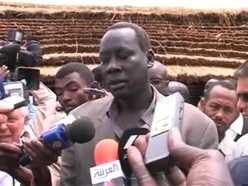Bombing in oil-rich border areas of South Sudan
South Sudan's oil-rich border areas were the target of Sudanese Armed Forces (SAF) bombing for the second consecutive day Tuesday in one of the biggest confrontation since independence last year, putting lives of over 16,000 Sudanese refuges living in the area at risk.

"After a day of attacks by air and ground troops on Monday, this morning we heard the Antonov (aircraft) return, and drop two bombs," Information minister for South Sudan's Unity state Gideon Gatpan Thoar said.
The bombing followed the eruption of clashes on Monday between SAF and South Sudan's army, known as the Sudan People's Liberation Army (SPLA), around the oil-rich town of Heglig in South Sudan's Unity State.
South Sudan's President Salva Kiir announced the SPLA's takeover of Heglig and claimed that the military escalation was provoked by SAF's aerial attacks on Jau and Pan Akuach followed by a ground forces assault in Teshwin.
Echoing similar charges, Thoar said Monday that the clashes in Heglig started when SAF attacked the Teshwin area which is "the junction between Heglig oilfields and Pariang" County, reported the Sudan Tribune newspaper.
South Sudan won independence in July 2011 in a referendum that came as part of a peace deal to end decades of civil war. However, fighting still rages in disputed territory along the border with Sudan.
Ownership of oil resources is a major source of conflict. In January, South Sudan shut down all of its oil fields in a row over the transit fees Sudan demands.
South Sudan depends on oil sales for 98% of state revenues, but has pledged not to restart production until a deal was reached.
There is also dispute over the common border, which the two states had agreed in February to resolve in three months, although this would exclude five disputed areas.
The Heglig clashes and the subsequent bombing of oilfields in Unity State ended a period of diplomatic rapprochement that saw the recently-separated countries reaching framework agreements on nationality and borders.
The latest confrontation is seen as a ruse to derail talks to resolve pending issues even as it raises the possibility of Khartoum and Juba going back to full-scale war.
The clashes have resulted in Sudanese President Omar al-Bashir suspending an April 3 summit in Juba with his Southern counterpart Salva Kiir.
The Sudanese 2nd Vice-President al-Haj Adam Youssef, in a live TV program, stressed that the repercussions of the Heglig attack does not allow for the visit to take place and accused South Sudan of plotting to control Heglig from the very beginning to prevent Sudan from using the oil wells.
Warning against any attack on Sudan's territory, Youssef said the attack will not pass lightly even if Juba makes a formal apology.
UN chief Ban Ki-Moon Tuesday appealed for calm while the UN High Commissioner for Refugees (UNHCR) warned that the lives of over 16,000 Sudanese refugees were at risk due to bombardment.
"UNHCR considers that Yida refugee settlement is not safe for long-term stay due to its proximity to the volatile border zone," UNHCR spokeswoman Melissa Fleming said.
"We consider that refugees' lives are at stake, so we do urge them to move."
The group of Sudanese refugees from the Nuba Mountains had fled across their country's borders to settle in the Yida camp, located in South Sudan's Unity state.
The UNHCR has been urging them to move amid repeated shelling in the volatile border zone since last year, but the refugees have opted to live close to their original homes.
Source: The Africa News.Net
- 610 reads
Human Rights
Fostering a More Humane World: The 28th Eurasian Economic Summi

Conscience, Hope, and Action: Keys to Global Peace and Sustainability

Ringing FOWPAL’s Peace Bell for the World:Nobel Peace Prize Laureates’ Visions and Actions

Protecting the World’s Cultural Diversity for a Sustainable Future

Puppet Show I International Friendship Day 2020

